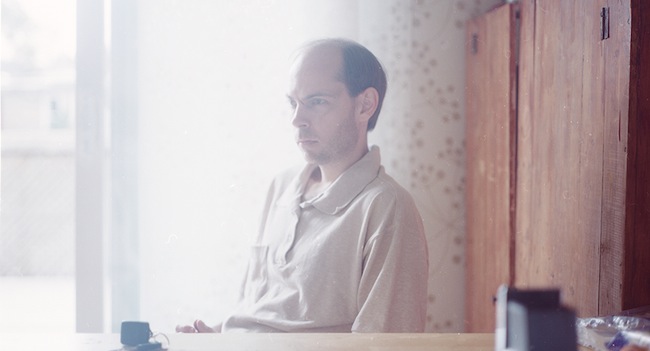Beginning today, Friday, February 22nd, the Royal Cinema in Toronto will be screening Kazik Radawanski’s debut feature film, Tower. It’s quite the debut. A quiet, well-observed study of a thirty something still living in his parents’ basement. Tina Hassannia has a rave review of the film for Movie Mezzanine.
Yesterday, I spoke to Kaz about the ins and outs of Tower, as well as how he came to co-found the Toronto-based indie production company, MDFF.
The first thing I want to ask, it’s a bit of an unusual film. It doesn’t have a normal narrative arc. Where did the idea for Tower come from?
Where did the idea come from? I don’t know, it came from a lot of different places. I’d made a few short films in a very similar manner, which I think got me used to thinking about characters, or even sort of situations a bit more openly. With all those films we worked with actors in a sort of similar process. We just got used to knowing that once we casted the main protagonist that a lot was liable to change. But I definitely had some specific ideas about the character, about the animation, the situational things, but for instance the construction stuff, when I was conceptualizing that it was a lot more literal in the way I’d pictured the character. I imagined him looking or being someone who worked with their hands for a living, but when we met Derek it became interesting that he was so out of place on the site. It definitely evolved a lot as we made it. I was a really organic sort of approach where we were encouraging things.
In terms of the script or the screenplay, it was really just sort of a skeleton of a script. It had sixty or seventy scene descriptions. I intentionally wrote more than we could fit into a film with the idea that we would drop some, and almost to encourage us to sort of rearrange them and really tailor it to what we found.
Does that mean you improvised a lot on set?
Definitely, yeah. I mean, I never gave the actors any dialogue or any sort of written scenes. All the dialogue was improvised, but it’s improvised but then heavily rehearsed afterwards, so it’s not like we’re catching new stuff each time. We’re kind of rehearsing it on the spot. But yeah, never any set lines or anything like that. And again, improvised in other ways, following new leads, or dropping things as well. It is totally fictional, but it was maybe similar to how you might make a documentary; that we’re following a character, but it’s a fictional character.
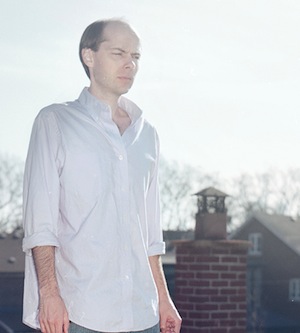
Your main character, Derek, played by Derek Bogart, he’s the central character of the movie, and so much relies on that performance. How did you find Derek?
In a pretty conventional way I guess now for indie films. We put out a call on the Internet and found him that way. We looked for a while though. It was a few months. I wasn’t expecting him to be someone like Derek, but then, just after talking to him a while, it started to become really interesting. Again, I didn’t imagine him being— I’d imagined him being like a construction worker, sort of a bigger guy, and definitely not someone that’s petite like Derek. I mean, Derek, his hairstyle was totally something that Derek introduced to film. I never imagined him being a balding man, or things like that. So lots of elements like that emerged when we found Derek. And Derek I think has acted a fair amount with other amateur directors, film students; I think he’s in a few TV shows, a lot of stuff on the History Channel, a lot of sci-fi stuff. I think this was definitely his first feature role in a dramatic film.
It’s funny that you say he was not what you originally envisioned because his look and his demeanor becomes so much a part of the identity of the film.
I think that’s what attracts me to making films is I just get so much more. I mean I always sort of wanted to make films, and make it when I’m immediately engaged with people. I feel like making something that I wouldn’t be able to do by writing. Again, we made three or four short films in a similar manner that were pretty successful that maybe gave us confidence to flip a feature. But yeah, definitely, it became sort of a fundamental aspect of our process.
And in terms of the look of the movie, how did you approach that? Because a lot of it is in pretty extreme close-up, often from a bit of a distance, so the camera is just barely catching things.
A lot of it is something that’s grown over years with all the shorts. You know, what was interesting was that we had like a mini-retrospective last week at the Royal as a warm-up for Tower. It was interesting watching the evolution, seeing them play together. Initially, it was something I always wanted to just embrace, like, impulses. So I think initially when I was making my first shorts that were shot in a similar manner it was just something I was drawn to. I like close-ups. Something about me as a filmmaker, or as a style, like handwriting, I really liked it being a bit crude or pushed in. It was something I was just drawn to.
As it has evolved I think I’ve gotten better at sort of understanding why I shoot it that way, and the effects of that type of style. I think it’s just a way in which I’m more comfortable shooting, as a filmmaker. I’m drawn to being close to people. I’m attracted to a sort of realism or intimacy with characters. But at the same time I think it’s really important for it to be uncomfortable, somewhat, for the audience. To not allow people to be that comfortable being that close to someone. In a funny way it becomes almost, out of respect to the character, almost to implicate the audience, to agitate them or put them in an uncomfortable space. To not be able to judge someone so carefully. Judging them from a distance would make it so much easier for the audience to pre-judge the character, or project an easy reading on them. That’s the headspace that I like people in when they watch the film, that they’re almost, you know, slightly agitated, at times laughter, but not totally knowing how to read each situation. It’s really my interest, too, as the filmmaker.
It also lends a bit of an objective reading, that sort of documentary-like style. Something about it being so character-centric suggests it being subjective, but at the same time being that close and capturing the small facial gestures and the style of dialogue, I like the way it positions me. It’s sort of out of my control. I’m not inside the character’s head. The character is still a bit of a mystery.
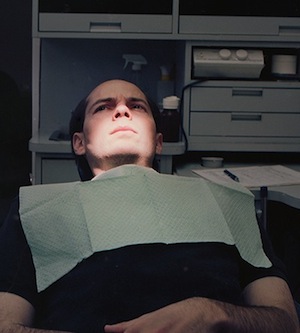
It reminded me, partly because I’ve been thinking about her a lot recently, of Andrea Arnold’s films, where she uses a lot of these extreme close-ups and playing with depth-of-field, except that in her case it’s often very subjective, a lot of point-of-view, whereas in this, it did the opposite. A lot of it is very focused on Derek’s face and just getting his reactions to these situations. In some cases it’s a little weird and you don’t exactly know how to feel about him. In some cases it’s very funny, and I wanted to ask you about that. Particularly early on, there’s the scene where his parents bring in their friends to view his animation in-progress.
Yeah, sure, humour is always something I like about a film, especially if it emerges on its own it’s something I’ve always embraced. But at the same time I’m afraid of calling it a comedy, and that’s happened a few times. When we screened once, somebody at the theatre was telling everyone, “go see this dark comedy,” and people went in and were really disappointed or confused or agitated. I love the comedic aspects, but I’d be hesitant to describe it as a comedy to people who haven’t seen it.
What’s funny is, I think it may have been around the time we started showing it to friends and filmmakers, there was an episode of Parks and Recreation that aired and it’s the exact same scene as in the basement. There’s a sort of comic timing to the shortness of the clip. And it was the same sort of comedic punch in a Parks and Rec episode, where he had been working on an animation or something and was showing it to people. So yeah, it’s a sort of a funny coincidence.
That’s always been a part of my films that I’m happy about, but definitely if you were to just describe the plot or lack of plot or the situation of the character, yeah, it would be easy to get bogged down in it being a sob story. I think it would be so much less effective if it was. It helps, the humour doesn’t let it sag down to much and sort of become about something else.
And the idea to have the character trying to learn animation, what was the impetus for that?
That? The impetus? I’d been around a lot of people that had been attempting animation or had been doing it at film school. You know, people that would be trying stop animation. But I think especially with 3D, how it’s emerged to be such a pop culture thing, or just a mass audience. The emergence of blockbusters. I mean I was always kind of fascinated by seeing adults going to see children’s films. It was important that he was sort of an artist, somewhat in spirit, or that he was attempting something like that.
But I also love that it’s sort of a non-art in a sense, too. You know, like I’ll have a friend of the family who has a kid that’s sort of artistically minded, sketching all the time, but he’s drawing pictures of sports cars. It was that sort of thing I was attracted to. ‘Cuase I think there are pitfalls of doing a film following an artist, and how to integrate their art into the film. But some of the stuff, like the animation and the story, was based on the animation of a friend. I mean I couldn’t have written that crazy plot of the film. And the animation itself was a real animation that someone had worked on.
Do you see the animation Derek showing ambition?
I think it’s really important for his situation, and it’s something I learned making a short film that also dealt with a type of depression. That people who suffer from symptoms or behaviors, I think it’s important for– It sort of justifies in his own head his existence. The maybe now I’m working or I’m struggling a bit, but someday I’ll be important or someday this will pay off.
But aside from it being something animated, being another world, it’s sort of a way for him to not fully acknowledge his situation. I thought it was an important tool for that, for him to sort of be aimless, but still somehow lie to himself about having a purpose. And something I like about this film is how animation is kind of a major defining point in the film and then it kind of fades away, and we don’t talk about animation so much. And then other things emerge, like the raccoon for instance, that end up driving some of his motivations.
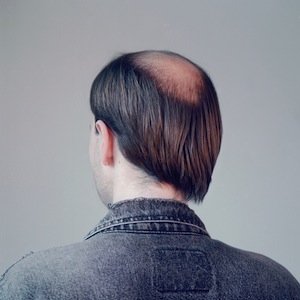
It’s almost like the second it becomes potentially a real thing—you’ve got the parents’ friend saying, “I’ll show this to some people”—then he starts to fade away from it. It’s kind of the same way in the relationship he has in the film with Nicole.
That was something I was very, very interested in when I was speaking about conceptualizing the film. Problems of that nature that I just felt were true to life. What is a crisis? Or what is a problem? Or what is a major experience for people? And how the just sort of fade in and fade out. For instance, with the title, I know it’s kind of an oblique title that doesn’t give the audience too much to insight, but in my head it was sort of a similar title to something like Elephant, that it’s something there, but then you kind of forget it. It’s this big weight, but then it’s sort of forgotten. That it’s this big thing that no one talks about.
And when I look around and I see people who– You know, what are the real sort of defining moments for people, and what are the things that really become struggles, or journeys or important parts of people’s lives, or what consumes people? Like people who suffer from anxieties or malaise or depression, that they’re sort of overwhelmed, or it’s this massive weight, and suddenly it’s forgotten or it goes away and it’s something else. I think I was trying to get at things of that nature with this film. So that’s why it becomes at times a real pursuit and a real source of an overwhelmingly stressful, awkward scene, and then it’s kind of forgotten, and then he’s ranting at his parents about it, and then he’s being humble about it. He’s constantly readjusting how he’s behaving with it, which for me is a character motivation I was interested in. And again, as I was talking about the writing process and things like that, Derek is still a mystery to me and a mystery to himself. I think that was always something I wanted to maintain in the film.
A lot of the film plays on how Derek views himself, and what he wants for himself, and what he thinks he can get, and it plays out in somewhat odd, almost funny ways. The fact that he goes out clubbing and he doesn’t look like he fits in. Was the clubbing element always part of the idea?
Yeah. At least sort of a night-life. Maybe even more than the clubbing it might have been the alcohol, the sort of intoxication and the morning after. It kind of captured that desire for companionship, but then it was completely refreshed the next day, or gone. You know, that sort of quest– He’ll be grinding a woman at a club, and then maybe having almost nothing to remember it by the next day outside from– That’s why something like the cut was important. Something so minor, but then touching on so many things at different times. Sort of hinting at bigger things. If he didn’t have that cut so many things maybe wouldn’t have been discussed. It was, for me, something that loosely connected all these things that could’ve maybe been forgotten otherwise.
I also wanted to talk about MDFF, which is the production company that you co-founded.
Co-founded with Dan Montgomery, who’s also the producer on this film and all my other films, too.
And what was the idea there, in starting this small production company?
The idea I guess is just something I learn really quickly, just the idea that to make these sort of films we’d have to be self-sufficient. That it would be very hard to convince someone to invest in Tower or even to work on the film. So in its most basic sense it’s something that helped us stick together a bit more and sort of focus ourselves. It’s something that grew out of film school as well. Sort of what happens outside of film school, what do we do out of films school, and what do we do over the summer, what do we do afterwards? It was a big leap for us to make our first film outside of that framework.
It’s just sort of realizing that it could be hard to operate as an independent artist, so it’s something that as the films have done well and we’ve become a bit more organized, we’re now reaching out and producing or helping other filmmakers make films. We’ve done a few shorts with—he used to be a Vancouver-based filmmaker, but now he’s moved to Toronto—Antoine Bourges, and hopefully we’ll have one or two collaborations coming out soon with other directors.
And the films have been fairly successful, going to all kinds of festivals. I believe Tower premiered at Toronto.
No, it premiered at Locarno.
Oh, very cool.
And then it went to TIFF afterwards.
So how’s that been?
That’s been incredible. For the work to be given that sort of spotlight. You know when we were making this, we weren’t really sure if we could find a home for it so it’s great that it’s found those types of venues and that type of audience, that there’s discussions about that film, and people are writing about it and that it’s continuing on. It’s seeming like the film is sort of exceeding our expectations now, just with the Royal screening coming up and other screenings in Toronto. And we just found out that we’ll be able to screen in New York next month at New Directors New Films at the MoMA. We never imagined it going that far. So to be given that showcase has just been incredible, because in a way I feel it’s a film that needs to be championed for people to take the chance on, especially with it being a first feature and not having too much of a reputation.
But at the same time it was important for me to find my voice as a filmmaker. It’s like I really wanted people to like the film for the right reasons, I didn’t want to have– Like, it’s hard to find tie-ins for this movie that maybe some other films would find success in. That it’s really almost– There are very few issues to pull from it. And that was something that was somewhat intentional. I wanted it to just sort of stand on its own, and for the discussion to be about what I found interesting. To put those elements right up in the front. Just went I was conceptualizing it, it was almost overly ambitious, but I remember writing that I want the film to be free of context. I think it was that sort of urge to orient the discussion just on what I found interesting and not for there to be external elements or “issues” for people to be distracted by those things. Just to put what I found interesting square in the middle.
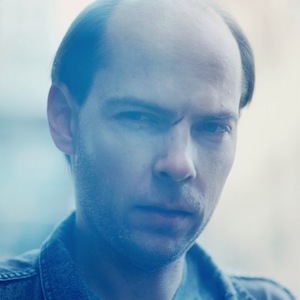
I guess the closest thing to an “issue” is the thirtysomething who’s still living at home.
Exactly, and that is something that just emerged as we were making it. And another one that honestly never occurred to me until it screened, but Asperger’s. Some people think he has Asperger’s or symptoms of Asperger’s. In fact there was a guy in one of the screening at TIFF, a guy with Asperger’s who said, “I have Asperger’s and this is a film about Asperger’s.” Because it’s a really good representation of that, which I found interesting. But I think that at the same time it partly might be due to the film being so open that people rely on those sort of things and maybe build in their own experiences.
I think there are multiple readings of the film and that there are moments in the film when he does things and there could be– Honestly, in my head there’s multiple reasons for why he did it. It’s an accumulation of different things. I like it, and I think it’s totally justified when people build in their own readings, and motives and why he’s doing things.
Last thing is, are you working on anything?
Oh, yeah. I’ve been developing a new personal project. I was hoping to make one or two more films just like Tower, in the sense of the scope of them and the production method. After the shorts and now this I think it’s something that I’ve really fallen in love with, making this style and I think it’s helping me grow so much creatively, I really want to embrace it and not jump the gun and complicate things that are sort of outside of what’s going really well for me. So I’m hoping to make another film like Tower in Toronto soon.
And like I said earlier, we’re more and more producing and trying to help other local filmmakers. Actually, screening along with Tower, each night we’re going to be playing different shorts by other local filmmakers. There are a few that we’re particularly excited to screen. One by a guy called Lu Lee who won the Dragon Prize at Vancouver this year, and he’s been making some exciting work, so we’re screening his short films. Another one by a guy called Zaheed Mawani, who’s short was just nominated for the CSA Awards.
So yeah, again, more and more we’re interested in– I just think there’s something emerging out of Toronto right now. It’s a really sort of healthy landscape for like-minded people that are making these sort of self-financed but more artistically driven projects. So I’m hoping to keep pushing that forward.
Well, thank you very much.
Yeah, thanks for talking with me.
Tower begins its run at The Royal this week. Tickets available online here.

















